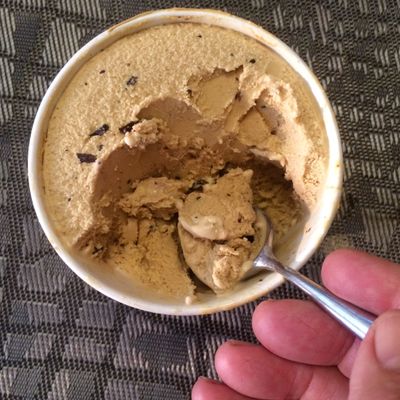
Just look at that pint of ice cream sitting there in the freezer case, all delicious-looking. It’s going to be amazing, right? All that butterfat and chocolate and God knows what else. It’s like a nutritional A-bomb, the kind of caloric combustion that would have melted the brains of our hunter-gatherer ancestors. Of course you want it. It’s a dopamine explosion waiting to happen.
Here’s the funny thing, though: Once that sense of anticipation has given way to the actual moment of indulgence, that pleasure tends to be quickly followed by a third stage: self-loathing. The belly is full, and the brain is writhing in self-recrimination.
This happens with so many pleasures: the night of carnal bliss that needs to be scrubbed off in a hot shower the next morning; the 10-hour Netflix binge that makes you feel like you’ve thrown your life away; the shopping binge that blows a rent-sized hole in your credit-card balance. Indulging has a way of making us feel like crap.
From the viewpoint of classic conditioning theory, this kind of hedonic flip-flop doesn’t make much sense. According to that model, we seek out rewards, and when we get them, we feel motivated to try to get them again. There isn’t any room in this account for self-flagellation.
You could say that our culture’s puritanical roots are to blame. But how puritanical, really, is a culture that gives us Hooters, Las Vegas, and the KFC Famous Bowl? The constant flow of advertising urges us not to feel guilty about indulging, but about not indulging.
A more convincing explanation arises directly from psychology. According to a new model of decision-making, the real reason we hate ourselves springs from the way we’re wired to calculate reward.
The delay-discounting model laid out by researchers such as George Ainslie and Howard Rachlin posits that pleasure-induced self-loathing arises from the conflict between mutually exclusive goals. In the ice-cream example, you have on the one hand a short-term reward — the yumminess of your frozen dairy treat — and on the other hand a potential long-term reward, the feeling of control over your eating.
Theoretically, you could spoon that Phish Food into your mouth and enjoy both outcomes: savor the flavor right now, and eat moderately in the future. But while you might consciously try to tell yourself that your little indulgence was “just this once,” deep down you understand that the world doesn’t work like that.
Instead, what happens is that the decision to indulge triggers a subconscious reevaluation. Every action we perform has two outcomes, the familiar hedonic value (the yumminess of eating ice cream) and a less obvious signal value (a message you send to yourself about what kind of person you are). You don’t get fat from eating a pint of ice cream; you get fat from being the sort of person who eats pints of ice cream. So once that final spoonful is down your throat, the immediate pleasure is past and all you’re left with is the lingering, bitter aftertaste of the signal you’ve just sent yourself: that you’re the sort of person who scarfs pints.
Your past self has just screwed you over, enjoying the calorie bomb of pleasure and sticking you with the remorse. (Indulgence often screws over our future self in more immediate ways, too: a stomachache, a maxed-out credit card, an STD …)
Some people say that guilt is a useless emotion. It certainly is an unpleasant one, but it has its purpose. It’s an aversive experience that alters our future calculation of reward. In effect, it makes us less likely to engage in self-defeating behavior, and thereby shifts our actions toward our ultimate long-term benefit. Instead of suppressing this emotion — or worse, drowning it in a wave of more ice cream — you could listen to it and accommodate it. One approach is to link a short-term reward to a positive action. Tell yourself, for instance, that if you meet your exercise goals for a certain amount of time, you’ll have a bowl of ice cream as a reward. Another idea: Cut down the opportunity for spontaneous orgies of overindulgence by stocking your fridge with treats that are less tempting, or at least smaller in size.
Guilt isn’t always something you should listen to, though. When misplaced, it can contribute to an excessive abstemiousness just as self-defeating as overindulgence. It seems to me that some of my ambitious professional friends spend so much time putting aside present pleasure for the sake of future success that they get out of the habit of having fun for fun’s sake. Attuned to optimizing their future, they reflexively assume that anything that doesn’t have an obvious long-term benefit is something to feel guilty about. Or, worse, they fear that allowing themselves innocent pleasure will get them so comfortable with the habit of enjoying pleasures that they’ll slip off the path to self-maximalization.
As Rachlin writes in his book The Science of Self-Control:
The workaholic who takes one day off is like the teetotaler who has one drink. At that point the workaholic is in a state of complete uncertainty about future patterns of behavior. This day off could be the first day of a more balanced life or the first step down the path leading to complete laziness and indifference … Both [workaholism and teetotalism] are revolts against indulgence. In most cases such revolts are less damaging than indulgence itself, but in some cases they can be worse than indulgence. The workaholic who sacrifices her own life to her career may also be sacrificing her family’s lives.
This is the paradox of living too scrupulously for one’s future benefit: The future continuously recedes, and the rewards never materialize in the present tense. For the workaholic (or the miser, or the strict dieter), there is no guilt, but there is also no pleasure.
In other words, once in a while you need to just go crazy with the ice cream.




